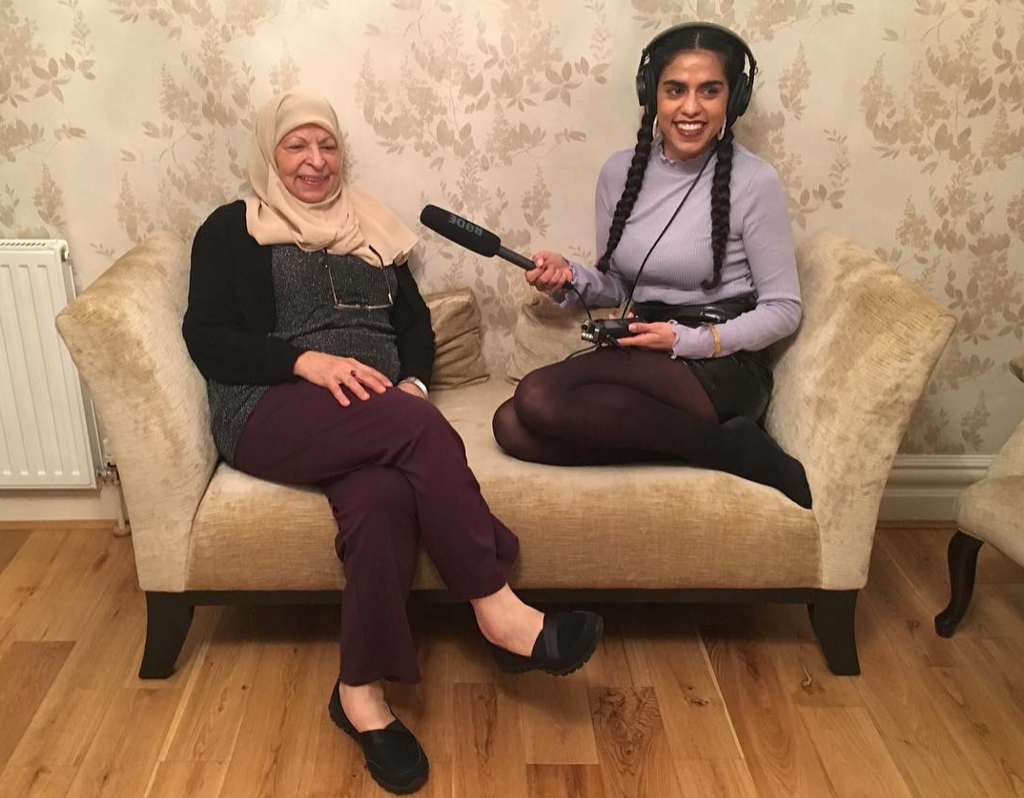Carrying Around My Shit
The diary of a Muslim immigrant in New York

Monday
I get to work at 7:30 a.m. so that I can go to the bank nearby. I want to ask about whether I would be able to transfer my savings out of the country if I’m forced to leave. The woman behind the counter looks at me like I’m crazy. The video camera on the counter looks at me like I’m dangerous.
After work I go to see my friend. She has two wonderful daughters, both engrossed in a cartoon on the TV when I arrive. I sit behind the couch to watch along, and the younger of the two slides off the couch and tiptoes around it towards me. She’s three years old and has a grin that completely disarms you. She’s offering me one right now — her little teeth perfectly alternate with gummy spaces. Her face doesn’t smile because she’s joyful, she seems to be joyful because she’s smiling. Lately, she has started asking people “are you ha-pee?” It’s a hard question to answer honestly (and it’s hard to lie to a child).
Tuesday
There is a problem with my visa. I went back to London over the holidays and when I re-entered America in January, border control wrote the wrong date of expiry when processing my visa. It’s supposed to run out next year, but they wrote February 14, 2017 for some reason. If HR hadn’t spotted the mistake in my electronic records, I would have become an unauthorized immigrant overnight. An illegal, without even knowing it.
I was advised to leave the country and re-enter showing the paperwork that proves I’m allowed to stay here long after February 14 but I’m too scared to leave in case I can’t get back in. I call a friend who tells me to call a lawyer for advice. I find one, and she advises me over the phone to stay put. She explains that travelling is a really bad idea right now; I should try to get the error fixed from where I am. She describes clients who have no attachment whatsoever to the seven countries affected by the ban but who are being detained nonetheless. The lawyer tells me to try calling a number tomorrow to schedule an appointment.
Her voice croaks as she is about to hang up the phone, she sounds like she is crying as she says “I was lucky to be born here.”

Wednesday
I call the number at 9:02 a.m., two minutes after the office has opened. An immigration officer with a Hispanic last name fixes my problem by 9:05 a.m. and wishes me a good day. I sit in the office meeting room until 9:10 a.m. trying to make sense of it all.
I’m allowed to stay after February 14.
Elle magazine have approached me to be on a list of single people that they are curating for Valentine’s day. They send me a short questionnaire to accompany my photograph. I respond to the questions like “What would be your tagline on Real Housewives?” with answers like “Financial independence is freedom.” I wonder if they’ll publish it.
Thursday
I go to see the lawyer who helped me on Tuesday. My future in this country could depend on this woman, so I need her to like me so I think about what clothes to wear and how much makeup to put on. She didn’t ask me for a cent for the call on Tuesday. I take flowers.
We talk in the ground floor of her beautiful Brooklyn home. She asks me whether I have dual nationality, where I have travelled to recently, what kind of visa I have and who vouched for me first time around. She asks whether I have an American boyfriend and I say “no, I don’t want a green card that way anyway”. She responds with another question:
“How tall are you?”
“Uhm, five-four, five-five I guess”
“You would be perfect for my son.”
She shows me family photos on the shelf, “That’s him.” “Oh,” I reply “he’s cute. Is that him in that one?” “No,” she frowns, “that’s me.” I feel terrible.
Her grandfather escaped the Nazis she explains, so she understands how being different can make you feared by others and that, ironically, that can make you fearful too. She gives me a big hug as she sends me out the door and says she wants to do anything she can to help me. I want to get her more flowers.
Friday
If you’re easily repulsed you might want to skip these next two paragraphs. My gastroenterologist told me to collect three days’ worth of stool samples so I have duly done so. I have to give them to the lab today but, holy hell, I also have to go to court first thing in the morning after being given a summons. While filming a video series, my crew and I walked on what we thought were disused railway tracks. Two police officers discovered our four-person film crew and, after chewing on their pens a bit and conceding that there were no signs to tell us the tracks were active, decided to issue us with tickets all the same.
Should I go to the courthouse, wandering through the metal detectors and appear before the judge with these plastic containers of my excrement? Or should I go to the lab first and risk being late to my first (and please, God, only) court appearance. I text my friend to ask her advice and she replies “who the f**k decided to call it a stool?” She has a point, albeit an unhelpful one. I decide to try to ditch the poop at the doctor’s office. I rush through the streets thinking how strange it is that no one else but me knows what these bags conceal.
I make it to the court in time and find my friend Mae already there. We watch other defendants filing in as we wait for the court to be in session. There are ten of us in this room, now fifteen, now twenty. It looks like a little chapel — wooden benches sit in rows facing front, divided by a middle aisle for us to walk down to meet the judge.
And then I see him. My heart is pumping so large that it pushes through my back against the wooden seat behind me. “Oh my God, ohmygodohmygodohmygod,” I say to Mae. “Oh my God,” Mae replies. She too has just noticed that the last two defendants to walk into the courtroom include a tall bearded man I haven’t seen in seven months. It’s my ex boyfriend. Turns out he had also been trespassing somewhere in Brooklyn late last year, trying to find a place to skateboard.
He hasn’t seen us and sits on a bench ahead and across the aisle from where we are. Mae rubs my leg and says, “Oh my God” again. Finally, he swivels in his seat to take a look at the courtroom. He sees Mae, his eyebrows raise then he looks to see who she’s with and says “Oh… hey.” I wave awkwardly and we both laugh at how ridiculous the situation is.
We each get an “Adjournment in Contemplation of Dismissal” — it means that the judge doesn’t care whether we’re guilty or not guilty. So long as we don’t get into trouble for the next six months, our cases will be dismissed.
Six months. Immigrants already know that we have to meet an impossibly high standard of citizenship. We have to be more patriotic, more polite, more hard-working. But this ruling makes me extra cautious to keep my head down and never be in the wrong place again. But that means not attending protests, that means not saying “I am here.”
At about 7:30 p.m., those of us who are left in the office hear that a federal judge has halted Trump’s “Muslim ban.” I look at a coworker who can also be described as Muslim (though she doesn’t describe herself that way). We both sigh — it’s good news we won’t get excited about. I notice how a lot of frightened people end optimistic sentences with the words “for now.”
Saturday
I leave my apartment at 8 a.m. to work on a series of data visualizations for Black History Month and don’t get back until 9 p.m. It’s worth it.
Sunday
I work until 5 p.m. when I have to go out for a date. It’s for a Valentine’s Day special of a podcast I’m working on.
There is nothing noteworthy about the date except that there is a producer sitting at the bar behind him with headphones on listening to our conversation. Where normally I am used to listening to a man talking at me about his dog, now I can spot someone in the far-off distance who looks slightly irritated on my behalf. I am used to shrugging when a man who is a musician and photographer explains polling to me (even after I tell him I am a data journalist).
He tells me he was going to vote for Trump but ended up going for a third-party choice instead. I don’t say very much. The producer comes over and says it’s time to wrap up. Would I go and wait in the other room while she asks him a couple of questions?
I haven’t cried all week but my lip quivers as I stand in the side room. The producer walks in and flings her arms open as she says “if I die, I want you to marry my husband and raise my child.” I burst into tears which I bury in her chest.
Mona Chalabi is the Data Editor of Guardian US. You can read her diary from last week here:
A chronicle of fear: seven days as a Muslim immigrant in America | Mona Chalabi
